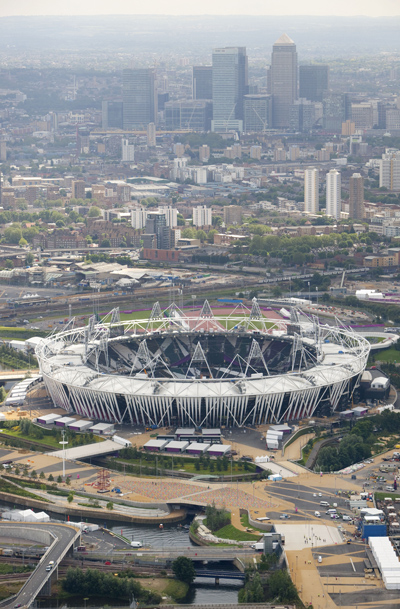Aerial shot over Olympic Park, London. Image showing the Velodrome. Photo by Anthony Charlton. Image via London 2012
There’s less than six hours to go until the 2012 Olympic Games’ opening ceremony, but much has been spoken about how the Games will be the greenest yet. So what are the sustainability credentials of the London Games?
When US Republican presidential challenger and businessman Mitt Romney visited London yesterday, he may have caused some ire after he raised questions about the UK’s readiness to host the London 2012 Games.
Describing the security levels at the Games as “disconcerting” in an interview with NBC News, Romney later in the day backtracked on his comments in media briefings following meetings with Labour Leader Ed Miliband, and subsequent talks with UK Prime Minister David Cameron.
One wonders what Romney would have thought about the ‘readiness’ of the games in terms of its sustainability efforts …
According to the London Organising Committee of the Olympic Games and Paralympic Games (LOCOG), when the organisers made the bid to the International Organising Committee they stated their intention to hold the world’s “first truly sustainable” Olympic and Paralympic Games.

Aerial shot over Olympic Park, London. Image showing a view of the Olympic Stadium looking towards Canary Wharf. Photo by Anthony Charlton. Image via London 2012
In all, London 2012 has sustainability themes: climate change, with the aim of delivering a low-carbon Games; biodiversity, to create new urban green spaces; waste, to deliver a zero-waste Games; inclusion, to promote the physical, economic and social regeneration of the communities where the Games are being held; and healthy living, to inspire people across the UK to take up sport and get active.
Here’s a glance at the green efforts of the London Games:
Olympic Park
According to the organisers, the Olympic Park is the most sustainable Olympic and Paralympic stadium ever built. Claiming that it is the largest new urban parkland built in Europe for 150 years, the organisers have estimated that more than 60pc of construction materials were brought to the site by rail or river to build it.
Carbon footprint
The Games’ carbon footprint is set to be measured throughout the event. The organising committee claims is the first Summer Olympic and Paralympic Games to measure its carbon footprint. The aim is to inform future event holders about how carbon emissions can be reduced or substituted.
Sustainable transport
Launched in 2011, the committee’s Active Travel programme is aspiring to achieve 1m extra journeys by walking and cycling in London each day of the Games.
Food
Apparently, LOCOG has set ‘Food Vision’ standards that all caterers at the Games must meet. The organisers are aiming to serve 14m sustainably sourced meals during the Games.
Waste
It seems no waste will be sent to landfills during the Games.